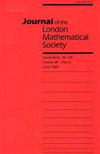Borel fields and measured fields of Polish spaces, Banach spaces, von Neumann algebras, and C ∗ ${\rm C}^*$ -algebras
IF 1
2区 数学
Q1 MATHEMATICS
Journal of the London Mathematical Society-Second Series
Pub Date : 2025-04-21
DOI:10.1112/jlms.70159
引用次数: 0
Abstract
Several recent articles in operator algebras make a nontrivial use of the theory of measurable fields of von Neumann algebras and related structures. This includes the associated field of automorphism groups and more general measurable fields of Polish groups with actions on Polish spaces. Nevertheless, a fully rigorous and at the same time sufficiently broad and flexible theory of such Borel fields and measurable fields is not available in the literature. We fill this gap in this paper and include a few counterexamples to illustrate the subtlety: for instance, for a Borel field of von Neumann algebras, the field of Polish groups need not be Borel.
波兰空间、巴纳赫空间、冯-诺依曼代数和 C ∗ ${rm C}^*$ -代数的波尔域和测量域
最近的几篇关于算子代数的文章对von Neumann代数(M x) x∈x $(M_x)_{x \in x}$及相关的可测场理论作了非平凡的应用结构。这包括自同构群的关联域(Aut M x) x∈x $(\operatorname{Aut}M_x)_{x \in x}$和更一般的可测量域在波兰空间上有动作的波兰群组。然而,在文献中还没有一个完全严谨,同时又足够广泛和灵活的理论来描述这种Borel场和可测量场。我们在本文中填补了这一空白,并包含了一些反例来说明其微妙之处:例如,对于von Neumann代数的Borel场(M x) x∈x $(M_x)_{x \in x}$,波兰群(Aut M x) x∈x $(\operatorname{Aut}M_x)_{x \in x}$的域不必是Borel。
本文章由计算机程序翻译,如有差异,请以英文原文为准。
求助全文
约1分钟内获得全文
求助全文
来源期刊
CiteScore
1.90
自引率
0.00%
发文量
186
审稿时长
6-12 weeks
期刊介绍:
The Journal of the London Mathematical Society has been publishing leading research in a broad range of mathematical subject areas since 1926. The Journal welcomes papers on subjects of general interest that represent a significant advance in mathematical knowledge, as well as submissions that are deemed to stimulate new interest and research activity.

 求助内容:
求助内容: 应助结果提醒方式:
应助结果提醒方式:


